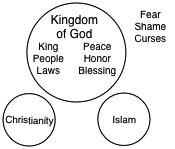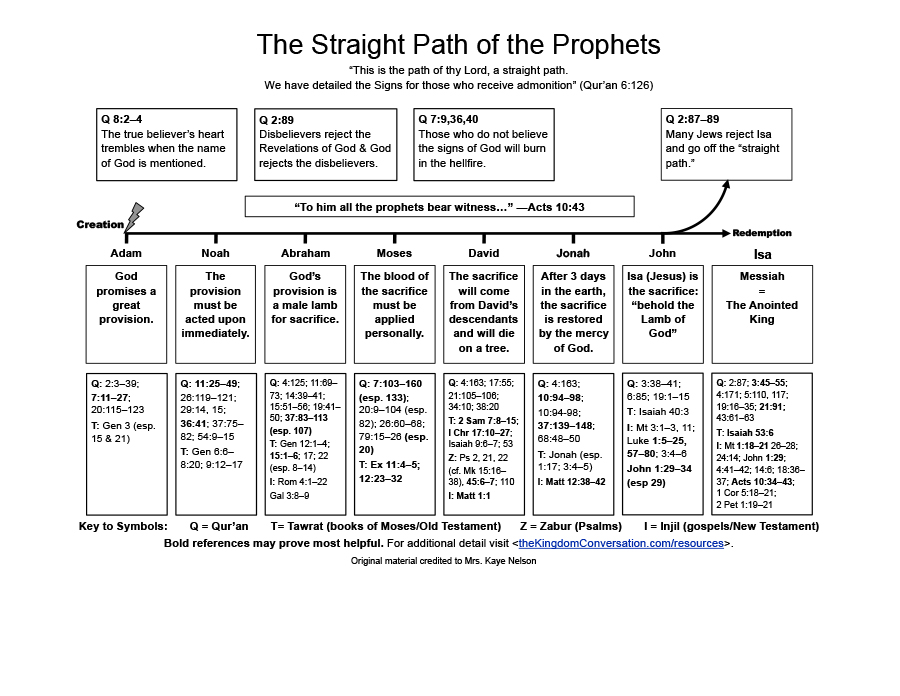Guide Muslims to the Bible

“Persons of Peace” is a Biblical concept describing those God has prepared to introduce their family and/or community to the gospel.1 Key to all disciple-making movement strategies is discovering and equipping such “Persons of Peace” to communicate the gospel to their family and community.
Sowing God’s Kingdom2 is useful for discovering such “Persons of Peace.” (Sowing God’s Kingdom is not a gospel presentation, just a tool for discovering “Persons of Peace.”) Path of the Prophets is a readily reproducible discipleship model which leads Muslims from the Qur‘an to the Bible and ultimately to the biblical Jesus.
Sowing God’s Kingdom
Discovering “Persons of Peace”
This true story is adapted for clarity in presenting this model:
In one Muslim country we began talking about God with “Ahmed,” a young
working man.
“Do you know what Jesus’ primary teaching was?”
“I’m not sure. Christianity?”
“No, Jesus never mentioned Christianity. He taught and modeled the kingdom of God—the rule and reign of God.”3 I drew a large circle, and wrote inside “The Kingdom of God — His rule and reign.”
 “What do you think would be in God’s kingdom?”
“What do you think would be in God’s kingdom?”
“There would be a King.” I wrote “King.”
“There would be people.” I wrote “People.”
“There would be laws.” I wrote “Laws.”
We agreed that God’s kingdom is eternal and powerful, with peace, honor and blessing for those inside. I wrote these in the circle. Outside God’s kingdom I put fear, shame and curses.
I drew two smaller circles and labelled them “Christianity” and “Islam.”
“Everyone starts outside of God’s rule and is separated from God.4 I was born in a supposedly ‘Christian’ nation, and you were born a Muslim, but Isa al Masih (Jesus the Messiah) said, ‘No one can see the kingdom of God unless they are born again.’”5
“Both the Qur‘an and the Bible teach us to seek God’s ‘Straight Path.’ 6 If I, born a Christian, try to behave like a Muslim to enter God’s kingdom, is that a straight path?”
“No.”
“And if you try to behave like a Christian to enter God’s kingdom, is that a straight path?”
“No.”
“Then let’s agree not to try to convert each other, but instead seek to walk together into God’s kingdom.”
Since Muslim cultures are generally based on honor and shame, I ascribe two common Muslim obstacles to Christians. This makes it easier for Muslims to think and talk about them.
“Two things commonly keep Christians from entering God’s kingdom:
- Some trust in being religious and following religious practices such as baptism, communion and attending church to get into God’s kingdom. But this is not what God’s scriptures teach.
- Others remain outside the Kingdom because they fear what their friends will think. They may want to know God better but are afraid that they will lose their friends or be ridiculed.
What keeps Muslims out of God’s kingdom?”
Ahmed exclaimed, “It is just the same for Muslims!”
“Would you like to study together what the Holy Scriptures teach about Isa al Masih and entering God’s kingdom?”
“That would be great.”
“One thing the Holy scriptures teach is the importance of honoring our parents. Before we study what the prophets teach, would you ask your parents for permission, and invite them to join us if they like.”7
At this point Ahmed had to react. “I know where you are coming from. You believe God had a son. A Holy God would never have a son. You believe the Bible, we know the Bible is corrupted. You believe in three gods, God the Father, Mary the mother and Jesus their son, we know this is false. There is only One True God. You believe Jesus died on the cross. He didn’t die.”
These words hurt. But this is what every Muslim is taught, so I expect this response.8
“I am sorry you feel this way. I am just a man who hungers to know God, and to study with others what our prophets say about Isa al Masih.”
As we parted ways, I thought “That didn’t go so well.” But soon Ahmed sought me out and we began studying together the Path of the Prophets.
Path of the Prophets
Introducing Muslims to the Biblical Jesus
“To Him all the prophets bear witness. . .” Acts 10:43
Muslims are taught that the Qur‘an is inspired and the Bible has been corrupted. We can sometimes argue individuals past this obstacle, but this rarely leads to a movement.
 For starting movements in Muslim communities, we find it far more effective to demonstrate the Bible’s inspiration than to argue it. And we don’t have to consider the Qur‘an inspired to find great relational and discipling value in reading the Qur‘an with our Muslim friends as context for studying the Bible together.
For starting movements in Muslim communities, we find it far more effective to demonstrate the Bible’s inspiration than to argue it. And we don’t have to consider the Qur‘an inspired to find great relational and discipling value in reading the Qur‘an with our Muslim friends as context for studying the Bible together.
Thus before studying together the Biblical accounts of prophets which Muslims also embrace, we seek the Spirit’s guidance regarding whether it would be helpful to read with our Muslim friends the Qur‘anic accounts of these same prophets. Our goal is introducing them to the wonder of Jesus and the Bible in a way they can readily share with their family, friends and community. We also want them to:
- discover the inspiration of Scripture for themselves,
- understand their own need for a sacrifice and a savior,
- see the fullness of Jesus and discover Him as Savior and Lord, and
- learn how to study God’s Word with others.
Muslims also start off trusting their subjective experience more than the Bible, and they are often eager to hear from God. When we ask a Muslim if we can invite God to speak to them in the name of Isa al Masih (Jesus Christ) as described below, He often does. We can then relate this to the Bible as God leads us. As Muslims come to faith, we then teach them that Scripture is the only reliable standard for testing what we hear God saying.
In our discussion with Muslims, instead of “teaching” the point of each story, we use a “Discovery” model9 to listen and ask questions to lead Muslims to discover, obey and share the central truths we have listed below. This makes the lesson more memorable and powerful, leaves room for the Holy Spirit to speak to them about other things as well, and encourages them to obey and share what they are learning.
After we discussed God’s kingdom, Ahmed wanted to meet again. We boldly asked, “May we ask God, in the name of Isa al-Masih, to speak to your heart right now? Close your eyes and we’ll lay our hands on you. When God has spoken to you, open your eyes and tell us what God has said.” Soon Ahmed opened his eyes and said, “God just told me that the next time we meet will be the best day of my life.” We intimated the authority of the Bible by affirming Ahmed’s statement with Scripture, “Yes, the Bible tells us that we draw our very life from the Word of God.” 10
Two teammates and I met Ahmed for breakfast a few days later to discuss the Prophets of God as found in the Quran and the Bible, starting with Adam. We would talk and discuss for about 30 minutes, then Ahmed would light a cigarette and say, “Let’s have a cup of tea.”
Adam and Eve: God makes provision to cover our sin and shame. We led Ahmed to recognize that a lifetime of good works doesn’t outweigh one sin, that without God’s forgiveness and mercy Adam and Eve would be lost forever, and that God instituted sacrifice to cover Adam’s disobedience and shame.
Noah: We must accept God’s provision. We led Ahmed to see that only God’s provision can save. After discussing the story, I asked Ahmed, “When this first rain started falling, if a man pledged to always pray five times a day but didn’t enter the ark, what would happen to that man?” Ahmed answered, “He would drown.” The point we are making is that man, by his own good intentions and effort, cannot save himself.
Abraham: God provides the sacrifice. We led Ahmed to recognize that Abraham’s son was rescued by God providing the male lamb for sacrifice.
The Spirit of God then led us to begin reading the Gospel of Mark with Ahmed so that we could look at the life of Jesus. We read Mark 1–4, continuing with tea breaks every thirty minutes during which Ahmed would smoke.
When we had to stop, Ahmed said, “God was right when he spoke to me earlier. Today has been the best day of my life!” Ahmed then allowed us again to ask God, in the name of Isa al Masih, to speak to him. After we did he said, “God just told me that what you are showing me is the truth, and I must walk in it.” We affirmed, “Yes, the Bible teaches us to walk in the truth.” 11 We agreed to meet again a few days later and encouraged Ahmed to share with others what he was learning.
The next time we met, we reviewed what we had learned from Adam, Noah, and Abraham, then continued.
Moses: We must apply the blood of the sacrificial lamb. We led Ahmed to see in the Passover story that an innocent lamb had to be sacrificed and the blood applied to the doorframe of the house or else the eldest son would die.
David: His descendent would become a suffering sacrifice. We led Ahmed to see that one of David’s descendants would have an eternal kingdom and a unique relationship with God. He would also be a suffering sacrifice and die on a tree.
Jonah: In the depths for three days, then back to life.We led Ahmed to the sign of Jonah as the prophecy to which Jesus pointed to indicate that He must die and be raised to life.
John the Baptist: Jesus is the Lamb of God. We led Ahmed to see that John pointed to Jesus as the Lamb of God who takes away the sin of the world.
Ahmed contemplated these stories in amazement as we repeated our cycle of tea breaks for Ahmed to smoke.
Mohammed: Pointing back to Jesus. We led Ahmed to see that Mohammed was honest about his own shortcomings, and pointed to Jesus as sinless, able to raise the dead, and the sign of the Day of Judgment.
Jesus: God’s chosen sacrifice. Finally we led Ahmed to look at the arrest, trial and crucifixion of Jesus by reading all of Mt 26–28. We reviewed all the previous stories to see Jesus as the one to whom these major Muslim prophets point as the Straight Path into God’s kingdom.
We again asked Ahmed if we could ask God to speak to him in the name of Isa al Masih. He closed his eyes and we laid our hands on him. Soon he opened them and said, “God told me that what you are saying is the truth, and that I must act upon it.” We affirmed, “Yes, the Bible tells us that ‘now is the time of God’s favor, now is the day of salvation.”12 We prayed with Ahmed that day that God would cover him with the garment of righteousness.13 Ahmed repented of his sins and put his trust in Jesus as the sacrifice for his sins. This was an even greater day for Ahmed, as he entered the kingdom of God.
Ahmed eagerly shared these things with his family and friends until he died of lung cancer a few months later.
Principles for success in studying the Path of the Prophets:
- Love Muslims.
- Search for and invest time in “Persons of Peace.”
- Pray with and for Muslims, in dependence on the Holy Spirit.
- Respect their family, their religion, their prophet and their book.
- Rather than arguing about the Qur‘an, open it alongside the Bible.
- Start with Adam and creation rather than the crucifixion.
- Lead Muslims to fall in love with the person of Jesus.
- Trust God to speak to Muslims as you pray with them and affirm the Bible’s authority.
- Create an environment for discovering and discussing what the Holy Spirit will teach them.
- Encourage them to share with family and friends what they are learning from the Prophets.









comments